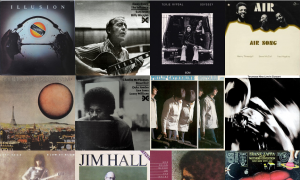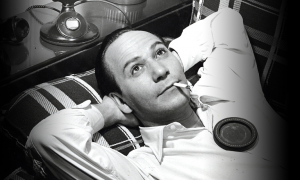Home » Jazz Articles » Top Ten List » Jazz For The Serious Connoisseur
Jazz For The Serious Connoisseur
 "Blackbird" (1980) by Bobby McFerrin, The Voice (Elektra, 1984)
"Blackbird" (1980) by Bobby McFerrin, The Voice (Elektra, 1984) When released, McFerrin's astounding virtuosity represented the first revolution in scat since Ella Fitzgerald. His entertaining and breathtaking "man chorale" approach utilizes rapidly juxtaposed tessituras, changeable vocal characters, integrated body percussion, plus other extended singing techniques. Creating acoustic sound effects, McFerrin even emulates wings fluttering as his "Blackbird" takes flight. Solo freedom here is actually tightly structured and practiced, unveiled as a precise song form that includes a repeating mixed meter architecture. When compared to McFerrin's live versions of this Beatles classic, listeners discover the apparent freedom achieved is largely subtle ornamentation over a stunning (carefully orchestrated) arrangement.
 "Double, Double You" (1984) by Kenny Wheeler, Double, Double You (ECM, 1984)
"Double, Double You" (1984) by Kenny Wheeler, Double, Double You (ECM, 1984) Simple yet masterful orchestration variants, creating a large-scale atmosphere, is a Wheeler hallmark. His Rubato A1 opens as a "horns alone" call and response, Michael Brecker to Wheeler, before the parts reverse with flugel calling to the tenor over impressionistic piano and drums (A'). For the 2nd chorus, Wheeler continues his calls to Brecker but framed over a patented Dave Holland / Jack DeJohnette ECM time feel. When A' is reprised anew, the flugel and sax perform tutti in octaves climaxing into solos first by Wheeler, Brecker, and then Holland over this deceptive 'little' form. Wheeler's out-head celebrates by restating the horns in octaves, then in unison, as Brecker's high register excites the triumphant gate of a modern classic. All told, the arranger had a doubly fruitful conversation with his own composition!
 "What Reason Could I Give" (1971) by Ornette Coleman, Science Fiction (Columbia, 1972)
"What Reason Could I Give" (1971) by Ornette Coleman, Science Fiction (Columbia, 1972) If Asha Puthli's earthy vocals seem eerily undermixed here, then take a moment to consider the subject matter presented as well as the equality of this collective expression. Coleman's ensemble, stitched together by Ed Blackwell's march-influenced time/solo, harkens back to the acoustic equality voices and instruments that must have been shared in early 'live' New Orleans jazz. Freedom then, and freedom now. Questioned repeatedly about his aesthetic approach(es), harmonic language, plastic alto, competence to write for orchestra, perform on violin, etc., Coleman's mind must have been swimming with "What Reason Could I Give"—for simply being himself—in this bluesy, spiritual cry for understanding (and acceptance).
 "Right Off" (1970) by Miles Davis, Jack Johnson (Columbia, 1971)
"Right Off" (1970) by Miles Davis, Jack Johnson (Columbia, 1971) John McLaughlin's filthy electrified shuffle comping and solo commentary opens this early fusion homage to the legendary boxer. The story is told that midway into this rhythm jam, Miles Davis enters i the studio as the music nearly fades to a stop—before his rhythm section senses that Davis means to jump right in (right off). McLaughlin swiftly leads his trio to a key ideal for Davis and the rest is history. Note how the rhythm guitar calls and responds to the trumpet's needs, effecting an inseparable dance. Davis varies only a handful of ideas: repeated note figures; chromatic ascending / descending double time lines; shrieks and/or trills; plus short, swung, pointed 8th note phrases to make his timely 'RIGHT ON' statement.
 "Steps—What Was" (1968) by Chick Corea, Now He Sings, Now He Sobs (Solid State Records, 1968)
"Steps—What Was" (1968) by Chick Corea, Now He Sings, Now He Sobs (Solid State Records, 1968) After a modernist transition cadenza, Corea launches into his re-definition of the 12-bar form, a blues form that began to be standardized scarcely 50 years prior. Repeating his non-jazz(?) head at a brisk cut-time pace, bassist Miroslav Vitous with 'snap, crackle, pop' percussionist Roy Haynes provide a sizzling, inspired backdrop to Corea's harmonizations, shredding 23 piano choruses before thematic repetition—leading to Haynes' remarkable series of some 16 deft, storming choruses before landing in a new 6/8 cymbal pattern—finally releasing their thrilling performance, metrically stepping down into "What Was" (another story altogether).
 "Laura" (1962) Ran Blake & Jeanne Lee, The Newest Sound Around (RCA Victor, 1962)
"Laura" (1962) Ran Blake & Jeanne Lee, The Newest Sound Around (RCA Victor, 1962) "Laura, the face in a misty light—footsteps heard down the hall—love flows on a summer night, that you can never quite recall—eyes, how familiar they seem—she gave her first kiss to you—that was Laura, but she's only a dream."
Johnny Mercer's haunting lyrics (paraphrased) to this David Raksin standard help illuminate Ran Blake's post-impressionistic interpretation—perhaps as a fitful night's soundtrack to a sweaty, unfulfilled dream. Avant-classical harmony mingles with prescribed form in a confluence that forecasts future European-tinged free improvisation. Note as Blake reinterprets the theme during the 2nd chorus to Lee's horn-like obligato. In combination, this was indeed, one of the newest sounds around.
 "I'm Late, I'm Late" (1961) by Stan Getz, Focus (Verve, 1962), composed & arranged by Eddie Sauter
"I'm Late, I'm Late" (1961) by Stan Getz, Focus (Verve, 1962), composed & arranged by Eddie Sauter Originally a Getz commission for Sauter, Focus captures both artists at a creative summit, pairing string orchestra with Roy Haynes' brushwork as a canvas for one of the most beloved tenor saxophonists of all time. Sauter opens with a nod to Bela Bartok's "Music for Strings, Percussion & Celesta," introducing first the orchestra, then Haynes' taut swing before the distinctive, smooth, supple and lyrical airiness of Getz enters. With the tenor soloing throughout and Haynes in duet with Getz, and/or locking with the strings, Sauter toys with his rhythmic opening theme. He staggers, stops, starts, restarts and then spins thrilling, expanding resolution phrases, seemingly through-composed out of such a modest amount of material, yet craftily (and thrillingly) repetitious. Besides Gil Evans' Sketches of Spain for Miles Davis, this is the early masterwork in 'third stream' music as classical and jazz are hybridized.
 "The Red Planet" (1961) by John Coltrane, The Complete 1961 Village Vanguard Recordings (Impulse! Records, 1997) (Eric Dolphy, composer (aka. "Miles' Mode")
"The Red Planet" (1961) by John Coltrane, The Complete 1961 Village Vanguard Recordings (Impulse! Records, 1997) (Eric Dolphy, composer (aka. "Miles' Mode") With a Schoenberg tone row-based ABA theme [antecedent call; retrograde rephrased 2nd call; bluesy consequent tag; modal pedal point solo "bridge" plus a final A], Dolphy's work with Coltrane's new quartet announces a recast world order compared with Miles Davis, Charles Mingus, or even Ornette Coleman of that year. Indian-inspired modal pedal point polytonality, McCoy Tyner's evolutionary voicings, Elvin Jones' revolutionary rolling commentary and Jimmy Garrison's co-independence combine in Rudy Van Gelder's live recording to capture 'Trane and Dolphy exploring each other's language. At times, they foreshadow Coltrane's last/late spiritual period. Such otherworldly expression must have been akin to 'speaking in tongues' for audiences in 1961.
 "You Go To My Head" (1953) by Stan Kenton, New Concepts of Artistry in Rhythm (Capitol Records, 1953), arranged by Bob Graettinger
"You Go To My Head" (1953) by Stan Kenton, New Concepts of Artistry in Rhythm (Capitol Records, 1953), arranged by Bob Graettinger The Kenton band's celebrated arrangements for jazz orchestra reach an early zenith in this stunning yet often overlooked masterwork. For anyone who's suffered severe bodily aches from an unfulfilled love, and/or far too much champagne, then Graettinger's take on this standard's lyric and harmony could not possibly ring more true. Look up Haven Gillespie's prose and follow along while this famed ballad is stripped of all thoughts of a bubbly, light-hearted love, instead reminding many listeners of their worst hangover experience. If you look for lyric meaning through interpretation, then it doesn't get any more direct (or bold) than this head-ily arranged vision.
 "Ko-Ko" (1940) by Duke Ellington
"Ko-Ko" (1940) by Duke Ellington In the 1920's when Ellington first heard Fletcher Henderson's Orchestra, he was so knocked-out by the muted trumpet work of Bubber Miley, he hired Miley at the first opportunity for his own band so as to hip his brass in how to 'talk' with a plumber's plunger. Ellington's resultant "jungle music" is caught at its height in this 1940 recording by his Jimmy Blanton / Ben Webster band. After an 8-bar intro, anchored by baritone sax master, Harry Carney, the 12 bar blues form is recast and modernized in an exotic, even wild, collective expression of Afro-American art music by Ellington's unmatched 'dance band.' Beyond the two plunger soloists, then Ellington's striking obligato outpouring over the third chorus, Blanton's acoustic bass is featured in acapella solo, replying to the raging shout chorus horns—a first. Louis Armstrong, King Oliver, and Buddy Bolden must still be so very proud, and honored, by this iconic K.O.
Tags
Top Ten List
Phillip A. Haynes
Chick Corea
Stan Getz
Miles Davis
Stan Kenton
John Coltrane
Buddy Bolden
King Oliver
Duke Ellington
Ran Blake
PREVIOUS / NEXT
Support All About Jazz
 All About Jazz has been a pillar of jazz since 1995, championing it as an art form and, more importantly, supporting the musicians who make it. Our enduring commitment has made "AAJ" one of the most culturally important websites of its kind, read by hundreds of thousands of fans, musicians and industry figures every month.
All About Jazz has been a pillar of jazz since 1995, championing it as an art form and, more importantly, supporting the musicians who make it. Our enduring commitment has made "AAJ" one of the most culturally important websites of its kind, read by hundreds of thousands of fans, musicians and industry figures every month.
























